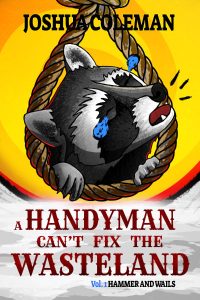I must admit that my book Hammer and Wails was originally inspired by the anime Trigun. But, that being said, the inspiration basically ends there. What I love about Trigun is the way it balances its humor with darker, more serious elements. It has characters that you can easily feel connected to, even though sometimes things get a bit weird. I also like the idea that the main character, Vash, is made out to be something horrendous that he’s not.
I started writing Hammer and Wails when the pandemic was in full swing. Life, in general, was depressing. It was culturally inescapable at that time, and I needed a good laugh. I knew Trigun could fill some of that need, so I rewatched it (which is impressive because I rarely rewatch anything at all).
I had finished a novel a few months before, but hit lull. I couldn’t get myself into the mood of writing. So I did something that I rarely do and try to avoid: I got inspired by someone else’s work. It makes me cringe to admit it because I hate the idea of taking elements from other works. But it was intended, at the time, to get me writing again. Somehow I came up with the idea of a handyman who was getting confused with a murdering maniac (instead of being the murdering maniac like Vash). Like Trigun, my character would live in a Wasteland world. Things could be as crazy as I wanted them to be. And I had a blast writing it. I wrote the first draft pretty quickly, which was only about 26,000 words. It’s now about twice that length. In the end, the inspiration from Trigun was limited to some pretty broad ideas. Wasteland. Confusion of identity. People are crazy. And that’s about it!
Now, you might notice that I’ve also written The Inevitable Series. This brings with it a much larger, and far more complicated inspiration, but I’m going to keep it short here. For about four years, I lived in a house church. It was an incredible experience, while at the same time, harmful to my emotional well being. There were elements of emotional abuse built within the culture of the group, and it took me a long time to come to that conclusion. After leaving the group, I needed a way to process what I was feeling, and journaling just made it worse. So I took my thoughts and feelings and poured them into fiction. It was my intention to create something that perhaps others might be able to empathize with. It was a unique perspective to write, focusing on the group and many characters, and the theme was (and still is, you can read it) about group dysfunction and how harmful ideas can be implanted into a “positive” culture.
And that’s all I have to say about that. If you’re curious, give ‘em a read. Better yet, you can listen to them instead, and listen to me pour out my emotions through the characters. Even the funny ones.

